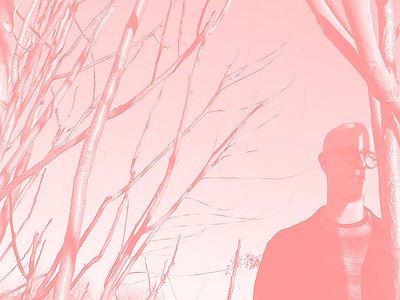Name: Richard Chartier aka PINKCOURTESYPHONE
Occupation: Sound artist
Nationality: American
Recent release: PINKCOURTESYPHONE's Shouting At Nuance is out via The Helen Scarsdale Agency.
If you enjoyed these thoughts by PINKCOURTESYPHONE and would like to find out more about his work, visit his official website. He is also on Instagram, and twitter.
We also recommend our earlier Richard Chartier interview, where he expands on a wider range of topics.
Can you talk a bit about your interest in or fascination for sound? What were early experiences which sparked it?
Pinkcourtesyphone has always been fascinated by sound, often mimicking sounds as a young thing.
No particular experience, but being buried in a pile of raked autumn leaves does come to mind.
Which artists, approaches, albums or performances using sound in an unusual or remarkable way captured your imagination in the beginning?
Pinkcourtesyphone’s early sound influences include: parental record collection, Eartha Kitt, Zoviet France, Martin Denny, 1950s-1960s lounge/easy listening music with glorious cover art, static between radio stations, the hum of the electric organ in the basement, Caretaker, Angelo Badalamenti, Peer Raben, Connie Francis, David Lynch, Fassbinder, Doris Wishman.
Pinkcourtesyphone originally began as a demo (unsent) in 1997 intended for Leyland Kirby’s V/VM records. those first pieces ‘afternoon theme’ and ‘evening theme’ can be heard on the first album ‘Foley Folly Folio’
What's your take on how your upbringing and cultural surrounding have influenced your sonic preferences?
Pinkcourtesyphone grew up in the suburbs of Washington, DC and hated it. It was very bland. The hissing of summer air conditioners and refrigerators were key. Pinkcourtesyphone loved parental dinner party music. Pinkcourtesyphone ate all the cashews from the cocktail nuts set out for guests.
Pinkcourtesyphone enjoyed the reverb of drained pools.
Suburbia in the USA is special type of hell, a glossy, shimmering, perfect-lawned facade. The opening scene of Lynch’s ‘Blue Velvet’ is a perfect encapsulation.
What, would you say, are the key ideas behind your approach to music and working with sound? Do you see yourself as part of a tradition or historic lineage when it comes to your way of working with sound?
Pinkcourtesyphone sets out to be elegant and detatched, presenting inviting / uninviting spaces. Pinkcourtesyphone desires to present an amalgam of obsession, sliced diced and smushed into a hazy blur for the listener, with sonic and textual puzzle pieces.
Every musician/artist/composer is part of a lineage of what came before them. A long vibrating string of pearls.
What are the sounds that you find yourself most drawn to? Are there sounds you reject – if so, for what reasons?
Pinkcourtesyphone is most attracted to sinuous, lugubrious, shadowy, static-y, warbley, melodramatic, emotive sounds.
No sounds are rejected because they can all be transformed.
Pinkcourtesyphone is not thrilled by bird songs, wind chimes, waves, or whales in ambient music … especially if there is zero context for their use or benefit.
Where do you find the sounds you're working with? How do you collect and organise them?
meticulously collected pieces of plastic and particulars.
dollops of cinema.
room tones from degraded films.
rejected variations.
long-held obsessions.
yesteryears’ “ideals”
From the point of view of your creative process, how do you work with sounds? Can you take me through your process on the basis of a project or album that's particularly dear to you?
The mood has to be right, there is no set process. pieces develop in their own manner. Sometimes quickly as sketches that are then nightmarishly toiled over to some form of “completion” for months. accidents can play a significant role.
The possibilities of modern production tools have allowed artists to realise ever more refined or extreme sounds. Is there a sound you would personally like to create but haven't been able to yet?
Limitation of tools is best, having everything possible is detrimental, one can become awash in pointless tech-fuss.
There is no sound that cannot be created, its all just a combination of waves.
From the concept of Nada Brahma to "In the Beginning was the Word", many spiritual traditions have regarded sound as the basis of the world. Regardless of whether you're taking a scientific or spiritual angle, what is your own take on the idea of a harmony of the spheres and sound as the foundational element of existence?
We are all just a collection of vibrations, some vibrating more dramatically than others.




